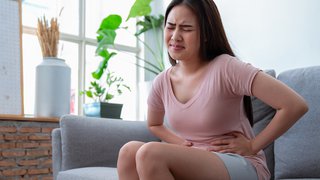Symptoms of Endometriosis
The most common symptom of endometriosis is pelvic pain, often during the menstrual period, that is worse than typical menstrual cramping. Pain outside of periods is also very common.
Other possible symptoms include:
- Chronic lower back pain
- Pain during or after sexual intercourse
- Pain with bowel movements or urination
- Infertility
- Digestive issues such as bloating, constipation, diarrhea, or nausea, especially during periods
Diagnosing Endometriosis
Our skilled gynecologists have extensive experience in evaluating symptoms to diagnose endometriosis and rule out other conditions with similar symptoms. We begin with a thorough evaluation that includes a:
- Discussion of symptoms
- Review of personal and family medical history
- Physical exam
To help with diagnosis, we might recommend one or more additional tests, such as:
- Ultrasound: Imaging that uses sound waves to produce images inside the pelvic region to check for abnormal growths
- Magnetic resonance imaging (MRI) scans: Equipment that uses a large magnet and radio waves to produce detailed images of the pelvic region
- Laparoscopy: Minimally invasive procedure in which a doctor makes a small incision near the navel to insert a narrow scope to view inside the pelvic area for abnormal tissue growth
Treatment for Endometriosis
Based on our evaluation, our gynecologists consider appropriate options to develop personalized treatment plans for each patient. These vary depending on each woman’s specific situation and whether she wants to have children in the future.
We typically begin endometriosis treatment with medications and other conservative treatment options. Nonsteroidal anti-inflammatory drugs (NSAIDs), such as ibuprofen or naproxen sodium, can help relieve pain, but if endometriosis is suspected, we will also generally recommend medications.
Other medications include hormone therapy, for women who are not trying to become pregnant, to help manage the symptoms. Hormone therapy options include:
- Contraceptive pills taken orally, patches applied to skin, or rings inserted into the vagina
- Gonadotropin-releasing hormone (Gn-RH) agonists and antagonists to lower estrogen levels and stop menstrual periods
- Progestin pills, injections, implants, or intrauterine devices (IUDs) to stop menstrual periods
- Aromatase inhibitors to reduce estrogen levels
If symptoms of do not improve with conservative methods over a few months’ trial, our gynecologists have expertise in gynecologic minimally invasive surgery techniques, such as:
- Gynecologic laparoscopy to diagnose and remove and excise abnormal endometriosis tissue and scar tissue from organs, restoring anatomy and functioning
- When indicated, treatment of ovarian cysts of endometriosis called endometriomas (can be performed through either minimally invasive or open procedures)
- Endometriosis in other areas, such as on the bowels, bladder, lungs, or in the skin can also be removed by our multidisciplinary team of specialists
Our expert team of gynecologists also works with a multidisciplinary team of physicians from disciplines including physical medicine and rehabilitation, colorectal surgery, urology, and pain medicine to address the whole patient and to collaborate when needed in the care of patients with endometriosis.









